Health Paradox: Reflecting on the biggest breakthroughs and challenges in 2024
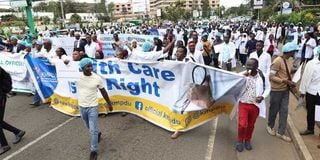
What you need to know:
- The year 2024 was a whirlwind of health milestones, controversies, and groundbreaking advancements.
- In this special feature, the Healthy Nation team reflects on the defining events of 2024 and their impact
BY HEALTHY NATION TEAM
The year 2024 was a whirlwind of health milestones, controversies, and groundbreaking advancements. From transformative policies to cutting-edge scientific innovations, the health sector took centre stage, highlighting significant progress while exposing pressing challenges in the quest for equitable healthcare.
In this special feature, the Healthy Nation team reflects on the defining events of 2024 and their impact.
Social Health Authority
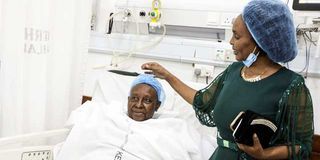
Catherine Kiema (right) attends to Emily Dama Mwaro who underwent a successful Dual Chamber Pacemaker Surgery, a heart Treatment Proceeding at the Coast General Hospital in Mombasa in this photo taken on 28th October 2024. The treatment which nearly cost Sh500,000 was catered for by the new Social Health Authority (SHA) Insurance Fund introduced by the Government. Photo/ Kevin Odit.
The launch of the Social Health Authority (SHA) on October 1, 2024, was expected to revolutionise healthcare through the establishment of the primary fund, the Social Health Insurance Fund (SHIF) and the Emergency, chronic and Critical Illness Fund (ECCIF).
While the government has praised SHIF as a bold step toward achieving Universal Health Coverage (UHC) and reducing healthcare inequalities, the transition has been far from smooth. Healthcare providers have raised concerns about delayed reimbursements, fearing disruptions in service delivery. Meanwhile, many Kenyans are worried about the reduced benefits package, with patients managing chronic illnesses feeling particularly excluded.
The shift from the National Health Insurance Fund (NHIF) to SHIF has also been hampered by logistical issues. Delays in registering members, poor public awareness campaigns, and difficulties in merging the old system with the new one have created confusion. Critics argue that better engagement with stakeholders is crucial to overcoming these hurdles.
For now, Kenyans remain in a wait-and-see mode as the government promises action on these issues.
Mpox
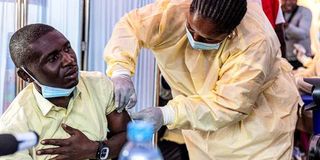
FILE PHOTO: A Congolese health official administers a mpox vaccination to a man, a key step in efforts to contain an outbreak that has spread from its epicentre, at a hospital in Democratic Republic of Congo October 5, 2024.
As of December 30, the total number of confirmed cases is 31 since the outbreak was first reported in May. The Ministry of Health noted that the cases have been reported across 12 counties, with the highest numbers in Nakuru. In July, the World Health Organization declared the ongoing outbreak a Public Health Emergency of International Concern. The are two clades (natural groups) of the virus: Clade 1 and a sub-division of Clade 11 (11a).
In August, scientists studying the new mpox strain reported that they were working in the dark due to the rapidly evolving nature of the disease. Months later., WHO announced that the first vaccine against mpox, the MVA-BN vaccine had been added to its prequalification list. Yet, even though only eight per cent of the 351 cases have tested positive for mpox, health experts are already raising fears of vaccine inequality.
Community Health Promoters
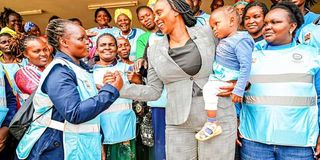
Public Health and Professional Standards PS Mary Muthoni engages Community Health Promoters (CHPs)at the Lang'ata Sub County Hospital in Nairobi. Photo | POOL
As the backbone of UHC initiatives, these workers faced monumental tasks of providing primary care and health education in underserved areas. Yet, their stories were marked by calls for better pay, training, and working conditions, sparking national discussions about valuing grassroots healthcare workers.
In September 2023, President William Ruto unveiled 100,000 Community Health Promoters (CHP) kits to achieve Universal Health Coverage. The digitization programme dubbed Afya Nyumbani aimed to digitise and financially support CHPs across the 47 counties to bridge the healthcare access gap at the grassroots level.
As of December 2024, the digitized health providers had registered about 8.4 million households against the target of 12.5 million. CHPs have also been able to screen over 22 million persons for diabetes, and 15 million for blood pressure, identified 339,000 women and linked 132,00 to health facilities.
Through the programme, over 5.9 million children under the age of five have also been assessed for early childhood illness.
However, the rollout has been clouded by a range of challenges hampering efficient service delivery including delays in budgetary allocations and poor network connection in some parts of the country.
Also, delays in last mile distribution of CHP kits with a likelihood of drug expiry, delayed distribution of commodities at the county level and lack of logistics hinder the implementation of the project.
While the country has 107,831 CHPs, 7,831 have yet to receive their kits since October 2023.
Medical Interns’ Woes
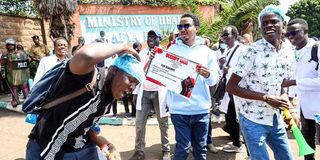
Medical interns during the occupy MOH demonstrations at the Ministry of Health in Nairobi on July 8,2024 as they demanded for immediate posting. PHOTO| EVANS HABIL
After balloting for their internship positions, approximately 1,200 medical graduates from various institutions eagerly awaited their placements in hospitals by November 2023. Their lab coats were pressed, scrubs embroidered with their new titles. But their excitement quickly turned into frustration as the government failed to post them, prolonging their wait indefinitely.
By February 2024, the interns were yet to be posted and protested over the same. The Kenya Medical Practitioners and Dentists Union (KMPDU) stepped in, announcing a nationwide strike that began on March 1. The strike, which lasted 60 days, saw solidarity from doctors nationwide. However, even after a deal was signed on May 8 between the government and the union, the interns’ issue remained unresolved. Many interns turned their idle time into service during the Finance Bill protests to treat the injured demonstrators.
On July 17, Health Principal Secretary Mary Muthoni finally announced that interns would be posted by August 1. Yet, this news came with another blow—a salary review that slashed their pay to approximately Sh70,000, a decision justified by the president in April under the mantra of “living within our means.”
The salary cut and delayed payments further exacerbated the interns’ hardships. Tragically, in the chaos, two medical interns died by suicide.
Finally, on December 20, after a relentless push by KMPDU, the government reinstated the interns’ original salary of Sh206,000. While the resolution brought some relief, the year-long struggle highlighted the instability the many strikes have costs to the healthcare system.
Vaccination of Animals
Who would have imagined that a president would stand at a rally and discuss something as unexpected as a cow’s fart? Yet in 2024, it happened. But the story is far more significant than just a cow’s fart.
The controversy began with the announcement of a nationwide livestock vaccination programme targeting cows, sheep, and goats. The Ministry of Agriculture and Livestock declared that the initiative would roll out in January 2025. However, scepticism quickly brewed, with many Kenyans questioning the intent behind the program. The government’s silence on critical details only fueled the backlash.
The first public announcement of the program came from President William Ruto on November 8, during the Maa Cultural Festival in Samburu County. A week later, Wiper Leader Kalonzo Musyoka criticized the initiative, claiming it was driven by a foreign agenda and warning of potential risks to local breeds.
On December 17, President Ruto hit back at the critics, including Kalonzo, defending the government’s vaccination plans. His remarks triggered a wave of reactions, prompting the Kenya Veterinary Association (KVA) to weigh in on the matter. KVA endorsed livestock vaccination as a vital move but urged the government to pause the program and prioritize educating the public to address widespread concerns.
The debate took an unexpected turn on social media, where discussions about an anti-methane vaccine spiralled into heated arguments about “cow farts.” The KVA clarified in their statement that while the vaccines were locally produced, methane reduction in livestock was not a priority for Kenya, dispelling rumours that the initiative was tied to global climate agendas.
As of December 22, the vaccination program remains voluntary, leaving farmers free to decide whether to vaccinate their livestock. While the debate has settled for now, it has highlighted the need for transparency, effective communication, and public trust in the rollout of such initiatives. In a year filled with health headlines, even cows managed to spark a national conversation.
Polio virus outbreak

Kyle Anzimbu, 3 receive Polio Immunisation from World Health Organization Kenya Disease Prevention and Control Officer Joyce Onsongo on the last day of the first phase of the Polio Vaccination Exercise countrywide at the Kibera Vaccine Centre on May 26, 2021. PHOTO| LUCY WANJIRU
In September, the MOH announced a mass administration of polio vaccines following the outbreak of circulating Vaccine-Derived Poliovirus Type 2 (cVDPV2) in the country.
Before the vaccination programme, five polio cases had been reported in four children at the Kakuma Refugee Camp in Turkana County while another positive environmental surveillance sample was confirmed in Kamukunji Sub-county, Nairobi.
The first phase of the exercise started on October 2-October 8. At the end of the first phase, 3.6 million children between zero to 119 months had received the lifesaving jab. The statistics included 2.9 million children under the age of zero to 59 months including 5,896 who were zero-dose vaccinated.
During the second round of the mass vaccination, which kicked off from November 9 to 13, over three million children under the target age received their immunisations. The exercise was also able to reach 1922 zero-dose vaccinated population.
Kenya remains at risk of polio outbreaks due to the fraction of children who fail to get lifesaving vaccines and the infectious disease outbreaks in the neighbouring countries.
Previously, Kenya reported polio outbreaks in 2006, 2009, 2011, and 2013 while all the outbreaks were from the neighboring countries.
Malaria Vaccine

Seven-month-old Queensly Harriet received her second dose of the Malaria Vaccine at Ndhiwa Sub-County Hospital in Homa Bay County on April 16, 2021. PHOTO| Francis Nderitu
In the world of innovations, the long-awaited rollout of the malaria vaccine brought hope to millions in malaria-endemic regions marking a significant leap in preventive health measures.
The long-awaited rollout of the R21/Matrix-M malaria vaccine in 2024 has brought renewed hope to millions in malaria-endemic regions, marking a significant leap in preventive health measures. Developed by the Serum Institute of India in collaboration with the University of Oxford, the vaccine is a game-changer in the fight against malaria.
Prequalified by the WHO, the vaccine is now set for mass distribution in Africa, where malaria claims hundreds of thousands of lives annually, the majority being children under five.
Weight-loss medications

A woman measuring her waist size. PHOTO| Shutterstock
Global health trends also rippled through the country, with Ozempic, a diabetes drug turned weight-loss sensation, becoming the topic of heated debate. The surge in demand exposed ethical questions around drug repurposing and access disparities for diabetic patients who need them most.
Pig-to-man transplant-Bridging the global organ shortage crisis
In March 2024, surgeons at Massachusetts General Hospital in Boston performed a groundbreaking pig-to-human kidney transplant on 63-year-old Rick Slayman, who had been declared brain dead. This milestone marked a significant step toward solving the global organ shortage crisis.
The transplant involved a genetically modified pig kidney designed to minimize rejection by the human immune system using advanced gene-editing technologies like CRISPR. This allowed scientists to remove or modify genes that typically trigger immune responses.
While this breakthrough has excited the medical community, challenges remain. Ensuring the long-term success of such transplants, addressing ethical concerns, and navigating regulatory hurdles are critical next steps.
Kenya resumes GMO crop cultivation
This year, Kenya reclaimed its position among 10 African nations allowing the cultivation and sale of genetically modified (GMO) crops and foods. This follows a landmark High Court ruling on November 7 that dismissed cases opposing the 2022 decision to lift the GMO ban.
The court affirmed that Kenya possesses robust regulatory mechanisms, led by the National Biosafety Authority (NBA), to manage GMOs safely. Despite protests from smallholder farmers, this decision paves the way for the commercialization of genetically modified maize seeds developed by the Kenya Agricultural and Livestock Research Organization (KALRO) and the African Agricultural Technology Foundation (AATF). Both organisations have applied for licensing, pending NBA approval and public participation.
Cancer Vaccines: A breakthrough in personalised treatment
The National Health Service (NHS) is introducing innovative cancer vaccines using messenger RNA (mRNA) technology, a ground-breaking development that offers personalised treatment for cancer patients.
This advance marks a significant milestone in the fight against cancer and offers new hope to people living with the disease, particularly in Kenya, where about 40,000 Kenyans are diagnosed each year. The vaccines work by using mRNA, the same technology used in the Covid-19 vaccines. mRNA carries instructions for the body's cells to produce specific proteins that stimulate an immune response. In the case of cancer vaccines, the mRNA is tailored to target unique proteins found in an individual's tumour. While challenges such as cost and accessibility remain, the development of mRNA-based cancer vaccines represents a major step forward in oncology, experts say.
AI-powered platform revolutionise maternal care in rural Kenya
Innovators, healthcare professionals, and advocates have come up with innovations, PROMPTS, an AI-driven platform developed by Jacaranda Health, designed to support maternal care.
PROMPTS operates via SMS, making it accessible even to women using basic feature phones without internet access. Mothers sign up for the free service during routine visits to public health facilities, which cater to 85 per cent of underserved women. Once enrolled, they receive tailored pregnancy-related information, symptom alerts, and reminders.
The platform leverages Natural Language Processing to detect high-risk symptoms and prioritize urgent cases for medical attention. Women can also ask questions and receive timely responses or be referred to medical professionals in emergencies.
Angela Oketch, Linet Owoko, Hellen Shikanda, Lilys Njeru, Angeline Ochieng, Pauline Ongaji, Brygette Ngana.


